- Home
- Rose Tremain
The Garden of the Villa Mollini Page 6
The Garden of the Villa Mollini Read online
Page 6
Over the years, I’ve thought about it very many times, that moment of opening the wardrobe in Mrs Lund’s room. I see myself exactly as I was then, reflected in the mirror, wearing my blue polka-dot skirt, my face solemn but full of expectation, on the brink of a momentous discovery. And then I see the inside of the wardrobe, not, as I had imagined, filled with Mrs Lund’s possessions, but completely empty except for one small object, a black leatherbound notebook. These things made a kind of tableau, like a snapshot. I caught it then and I have it still in my mind, a split second of the future, waiting.
I picked up the notebook, sat down on one of the beds and opened it. On the first page, in fine italic handwriting were the words: Tagebuch von J.B. Zimmerli – the diary of J.B. Zimmerli. Above the first entry were written the date and place: Wien, November 1937. I turned the pages, understanding hardly a word of the careful handwriting, but noting dates and places. The entries ceased, with several blank pages remaining, in March 1938. As I came to the final entry, something fell out of the notebook onto the floor. I picked it up. It was a photograph of two children, a boy and a girl, aged perhaps ten and eight respectively. It was summer in the picture. The two children squinted into bright light. Behind them was the glimpse of a lake.
That night, I tried to sort it all out in my head. I’d found nothing in the Zimmerlis’ house, apart from the absence of the rolling pin, that proved them guilty of Mrs Lund’s murder. No possessions stowed away, no sign of her suitcase. I’d gone into every room. I’d tried to think clearly, like a proper detective, aware that clues are not always hidden, but sometimes in plain view, but the longer I searched, the more I began to doubt my first conclusion. It was possible, after all, that Mrs Lund had left very late on the night that I saw Jani crying. A taxi could have come for her, or Walter could have driven her to the station. Perhaps, even, she had left before Jani’s weeping and it was precisely because Mrs Lund had left that Jani was so upset? And what about the digging? Well, here too, there were logical explanations: Walter’s neighbours, including my mother, had been nagging him to do something about his weeds for long enough. Perhaps Mrs Lund, too, had ticked him off and even given him the idea of planting the strawberries.
I decided I would let the whole matter rest for a while. Already my brain felt tired with it and I was beginning to feel glad that I didn’t work for the Suffolk Constabulary. I would go in from time to time and water the house plants and I would make sure the strawberries didn’t die. And I would wait. In time, I thought, I will probably understand.
The only thing I’d taken from the house was the photograph of the children. I looked at it for a long time and the longer I looked, the more I became convinced that these were the children of Walter and Jani. Because it had always seemed strange to me that the Zimmerlis, who appeared so contented with each other, hadn’t got their own family. Had something terrible happened to these children? Was it for them that Jani cried? Were the strangers, clutching their pots of jam, the only people to be told of the tragedy? Was this their function, to be silent, anonymous listeners? My father often said he found it easier to talk about my mother’s death to strangers than to his friends. One day, he said, he told the lift-man at his office and the lift-man had been very nice to him. If this was true for my father, perhaps it was true for Walter and Jani?
As the days passed, I found I was getting very fond of the photograph. I could imagine the scenery behind the children: the huge lake, a hazy shore line, incredible mountains with snow on their peaks. It calmed me to think of a foreign place – as if part of the future might take place in it. I hid the photograph in my other bedsock, but the nights were warmer now, so the socks and the pictures lay folded under my pillow.
As the weathermen had predicted, that summer of 1957 was very hot. Through the first two weeks of June, my father and I watered the Zimmerlis’ strawberries and by the third week the strawberries were ripe. There was no sign of Walter and Jani and birds had already begun to peck at the fruit. We stood by our fence and surveyed the crop.
‘Terrible waste,’ said my father.
‘Let’s pick them,’ I said, ‘and make jam.’
We bought a preserving pan. In our larder, we found dozens of jam jars, brown with dust, saved by my mother for this day she would never see. On the evening the jam was labelled and put back into the larder – thirteen pounds of it in twenty-one jars – Walter and Jani returned. We saw them kneeling down in the strawberry beds and lifting the leaves to search for the fruit. I called from my upstairs window: ‘Don’t worry! It’s all safe!’ And when I took the jam round to them the next day, their gratitude seemed to overflow, as if I’d brought them something of great value.
‘So kind, Walter, isn’t it?’ said Jani, picking up one of the pots. ‘So much work and kindness.’
‘Indeed,’ said Walter, ‘indeed this is most thoughtful.’
‘You could sell it on the road,’ I suggested.
‘Yes,’ said Jani, ‘but you must have all the money. Holly must have the profit.’
‘Yes,’ said Walter, ‘and next year too. The plants will grow a little larger and we shall have a better crop.’
‘It’s kind of you,’ I said, ‘but you don’t have to give me any money.’
‘But we want to do this,’ said Jani, ‘maybe you can buy a polka blouse to match your skirt.’
I returned the house key to them. As I went to the door, Jani came with me and put her arm, which was still much thinner than it had once been, round my shoulders. ‘Like you,’ she said, ‘we have had some sad times. We lost Walter’s mother.’
‘She died?’
‘Yes. In one way so sad, yet in one way happy. Walter’s father was killed by the Nazis in 1938 and, since this time, his mother was all these years in an institution, not knowing really what the days were, but thinking the time is before the war and she is a girl again, like you. In her last days, she says to the nurse, do my breasts grow?’
‘I’m very sorry,’ I said.
‘Yes,’ said Jani, ‘sorrow for all. But that is why we put in the strawberries: Mutti’s favorite fruit.’
I pieced it together then. Mrs Lund – an old friend of the family? – had been a courier. She’d brought not only the news of the death of Walter’s mother, but had come to hand over the few possessions of the dead woman, the most important of which was the diary belonging to her husband, J.B. Zimmerli. It was for Walter’s mother that Jani had wept, and it was their mourning that had made them thin. There was no body in the garden. The only bit of the mystery I couldn’t solve was the identity of the children and I thought now that I never would.
I knew I had to find a way to return the photograph to the wardrobe in Mrs Lund’s room, and I had made a plan. I would offer to help the Zimmerlis with their jam stall. On a hot afternoon, I would ask them if I could go into the kitchen for a glass of water – a request they couldn’t refuse. Then, quickly and silently, I would go upstairs and return the photograph to the black notebook.
But I wanted to have one last look at it. I went up to my room and reached under my pillow to pull out my bedsocks, but they weren’t there. With feelings of guilt and dread, I began to search my cupboards and drawers. Alan Ladd I could replace, but those children by the lake, that picture was perhaps all that remained of them. I looked out at the Zimmerlis’ house. They’d trusted me, called me their ‘caretaker’ and I’d betrayed them.
And then I saw my bedsocks. They were hanging on the washing line. I ran down to the garden, past my father who was sitting in the sun. I unpegged the socks, which were still damp. ‘Need them,’ I said to my father and fled back up to my room.
I put my hand into each of them in turn. Alan Ladd, made of inferior paper, was scrunched into a ball no bigger than a marble. I threw him into my waste paper basket. But the photograph of the children had survived. It was only slightly creased and not faded at all.
I held it against my face, smoothing it out. And then I noticed that there was som
ething different about it. Before the washing, the photograph had been backed with thick, black paper, as if it had been stuck into an album and cut out with part of the album page still glued to it. Now, the black layer of paper wasn’t there. I turned the photograph over. In the bottom right hand corner of it, a faded caption was still just decipherable. Dated 1926, it read: Walter und Jani an der See. And I understood.
For four years, I kept the Zimmerlis’ secret. In precisely the way I had planned, I returned the photograph to the notebook and of course Jani and Walter never mentioned either the diary or the picture to me. I grew fond of them and they seemed to become fond of me, yet on certain days, for no reason at all, they would behave very coldly towards me, as if they were saying to me, ‘Don’t come too close. Friendship is too knowing. We prefer still, as always, to talk to the strangers, who will never find out anything and who will never come back.’
And so, hurt one day by a rebuff of Jani’s – ‘Holly, go home now. You talk too much, always of boyfriends, always of your future. It’s boring, you know.’ – I decided to tell my father. We were sitting together in the kitchen. It was 1961. My father had encouraged his thinning hair to grow long over his ears. I took a sip of the white wine we were drinking and looked at my loving, would-be hippy dad and said solemnly: ‘Walter and Jani Zimmerli are brother and sister.’
He smiled and nodded. ‘Don’t tell the vicar,’ he said.
The morning I left home for my first term at university, I knocked on the Zimmerlis’ back door to say goodbye. Jani opened it, her hands and arms covered in flour. ‘I’m making pastry,’ she said, ‘come in.’
We went into her kitchen. I put the kettle on and watched her work. Her arms were fleshy again by this time. When the dough was kneaded to her satisfaction, she began to roll it out, using a painted metal cannister as a rolling pin. It reminded me of a thing my mother used to do: when she planted beans, she’d tread in the soil with her boot and roll it flat with an old tin barrel.
Tropical Fish
JOHN SPARROW IS dying.
Coming to the farm bungalow in the heat of early July, John Sparrow’s old friends notice the changes. Large John has shrunk, under the candlewick cover, to sparrow. The hand he gives each of them to shake (always polite, John, always correct) is bird bone. Then in the kitchen, where his wife Mary makes tea or squash as they prefer, she shows them her new microwave oven. It tells digital time. As they stand and admire it, the blue numbers flick on. Time is passing for John Sparrow, but at least he’s going rich.
His bed is near a window. He can still raise his head and see his acres, his single-minded land running flat to the sky. Harvest is coming. His wheat’s the colour of buff board. John Sparrow nods at it: good land, good decisions. Once he farmed temperamental stuff, mucky stuff: soft fruit, chickens, a jersey herd. Then he sold the cows and the poultry and tore out the raspberry canes and ordered his arable seed. He made way for it. He bulldozed his hedges and cut down the ash and sycamore and filled in the clay ponds. With no obstacles in its way, his seed grew strong and straight. Yet it needed more room. John Sparrow walked the boundaries of his farm and sized up the pastures of his neighbours and sized up their struggles. Solicitors were engaged. Contracts passed to John Sparrow in buff envelopes. His seed, legitimised, marched on.
Now, he’s leaving it. Mary Sparrow gets out the electric carver and slices bread for him. White bread and packet soups are what he tries to eat. Reared in a backward place, he’s dying a modern death.
On this hot, dusty day, Bob Sparrow, John’s only child, waits for the London train.
Bob Sparrow is the height his father once was, with his father’s broad nose and the smile of his mother, furtive and sweet. At thirty, unmarried yet, Bob Sparrow’s a fortnight from his twentieth harvest and days, perhaps, from his inheritance. His back is broad, his elbows fleshy, his belly in its leisurewear soft and fat. With his smart sneakers, with his briefcase full of catalogues, he looks like a rep. His nails are clean. He stands and waits and stares at the railway lines that shimmer. He fondles the change in his pocket. Easy, says his stance. Easy, says this nonchalant jingling of money.
On the train, he buys a four-pack and gets out his brochures. He spreads them around: sprayer arms, ten-row planters, water throwers, combines, bailers, tractors and ploughs. Two old farmers drinking tea stare across the aisle at the pictures. Bob Sparrow catches them staring, as if at pornography. He folds the shiny catalogues away and sits holding his paper cup, his face turned towards the fields.
He’s on his way to an exhibition, Agripower ’87. MIP is the dying John Sparrow’s most cherished philosophy: Machinery is Profit. And the son, Bob Sparrow, is obedient to the mind which saw the folly of the dairy herd, the waste of the raspberry fields, the mind which altered the landscape. MIP. This year, the investment is large and the farm is a company, Sparrow Holdings Ltd. The old men drinking tea mumble in lost voices. And the Norfolk flatlands pass and vanish, minced up by the train.
Bob Sparrow leans his head against the hot window and daydreams of flying. He’s never seen the Sparrow land from the air, but he can imagine its symmetry, his good ditches squaring it off on a neat grid. He’d like to own a plane. He wants to put himself above the land and look down. His mind puts up a windsock one field from the garden where the widow, Mary, will go patiently in circles with her Flymo. The sock struts tall above the tarmac runway, going east-west away from the silos. The wind hurtles in from the east. Easy. He’s airborne in seconds. The oaks – the few that remain – are in seconds small. Bob Sparrow smiles and feels pleased with life’s arrangement. John Sparrow walked on his patched and sculptured land and saw how it could be straightened. Soon, the old man will lie on his back, his nose pressed up to the clay, and he, the rich son, will walk above it.
Near London, Bob Sparrow finishes the beer. His belly feels bloated and his understanding diminished as the train goes slowly into the poor suburbs, Ilford, Seven Kings, Maryland, Stratford. He turns inwards from the grimy flats, turns his back on them and gets out his catalogues. ‘Do the sums before you buy,’ old John advises. ‘Outlay versus man hours saved. Work it out.’ And always Mary nods proudly, remembering a drudgery time, water saved in a butt, sheets boiled in a copper, yet one day confuses her men and surprises herself by asking: ‘What are the hours saved for?’
‘Sitting,’ replies John.
‘Flying,’ Bob wants to say.
‘I think you’ve all forgotten,’ says Mary.
Bob Sparrow gets out of the train and smells the trapped air of the station. Above his head, glaziers are painstakingly repairing ancient structures. Bob only glances at this work and hurries to the underground. Stepping up into sunlight again at Earls Court, he finds himself moving with a crowd towards the exhibition centre. This crowd annoys him. The eager people. He’d expected to be part of a chequebook élite. ‘Vision,’ John Sparrow is fond of saying, ‘needs space.’
His orders placed (orders for machinery John Sparrow will not see), Bob moves to Stand 56. The small, single-engined white plane sits on an area of plastic grass. Bob is invited by the salesmen to inspect the housing where the spray chemicals in their cylinders are clamped. The dummy cylinders are white like the plane.
He climbs, then, into the cockpit. (‘Doddle to fly, Sir, these, Sir.’) From the pilot’s seat he feels tall at last above the milling crowds. Only the instrument panel dismays him. How many man hours lie between this moment and his vision of his airstrip? ‘Easy, eh?’ says the salesman, grinning above his white shirt. Teach me, Bob wants to say. ‘Land in a field with these. Land anywhere, near enough,’ says the salesman. And Bob nods and thinks of his mother alone and going in little circles with her mower and turning her flat face and waving up. ‘Next year,’ he says. ‘I’ll be in a position then.’
So he moves out into the hurry of five o’clock and is caught by another tide of people going from offices to trains and buses. Though he half intends staying in the herd that pushes along t
owards the underground station, he drops out of it and goes into a pub where he orders a pint and a pie. He takes these to a leather bench and feels, as he sits, a deep weariness with the day. Though he thinks he will telephone the bungalow, he knows he won’t go home tonight.
He talks to no one. He goes once to the payphone. The payphone is broken. He orders more beer. In the bungalow, Mary will be plugging in the carver, measuring water for the soup granules. ‘Will the lad be home?’ John Sparrow will ask. Beer is sad stuff when John Sparrow is dying.
Bob goes back to the bar and orders whisky. The barman is Irish. ‘Storm comin’,’ he announces. Bob nods and pays and goes back to his corner. And within a very few minutes, the sun at his back on the thick pub window goes and he hears thunder.
Not wanting to be trapped by the rain, remembering Mary sitting on her own with the telly while John snores and snarls his way into his invalid’s sleep, he swallows the whisky, puts on his jacket and goes out into the street. Lights are on in Turkish take-aways, in pizza parlours: night starting in a foreign place. The huge storm moves in from the west, low over the airport.
Bob Sparrow hurries. The place he chooses has no hotel sign, only a hand-inked card, VACANCIES. The woman who opens the door is fifty and thick-waisted and she holds a small dog in her arms.
‘We used,’ she says as she walks up the stairs, ‘to breed champions.’
‘Champion dogs?’ Bob asks.
‘In this house,’ she says, ‘we used to exhibit.’
The room she shows him is carpeted and large and painted amber. ‘There’s this one,’ says the woman, her stubby hand on the metal door handle, ‘or if you find the tanks disturbing, there’s another one I let out at the back, but smaller.’

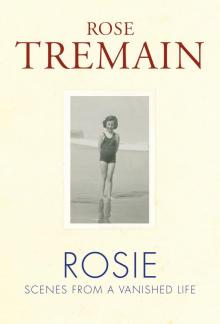 Rosie
Rosie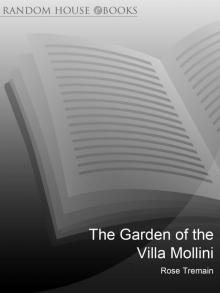 The Garden of the Villa Mollini
The Garden of the Villa Mollini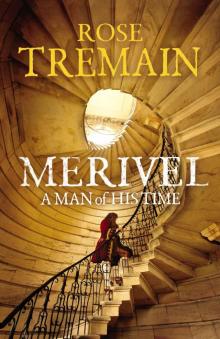 Merivel: A Man of His Time
Merivel: A Man of His Time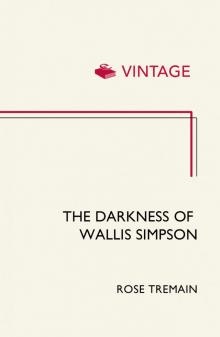 The Darkness of Wallis Simpson
The Darkness of Wallis Simpson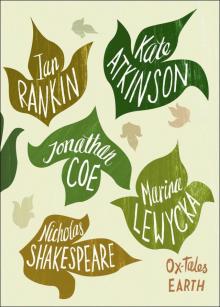 Earth
Earth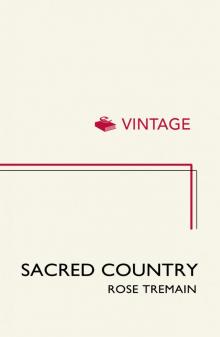 Sacred Country
Sacred Country The Swimming Pool Season
The Swimming Pool Season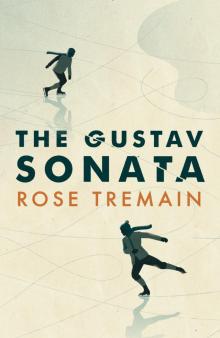 The Gustav Sonata
The Gustav Sonata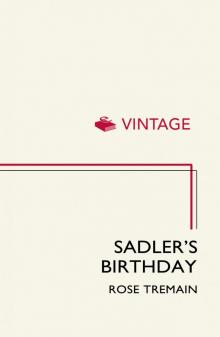 Sadler's Birthday
Sadler's Birthday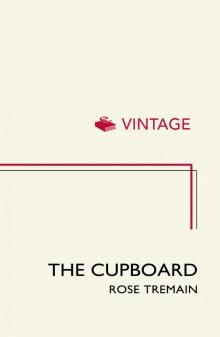 The Cupboard
The Cupboard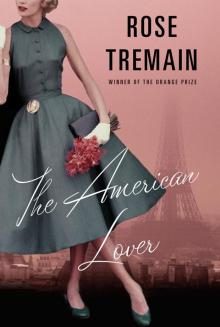 The American Lover
The American Lover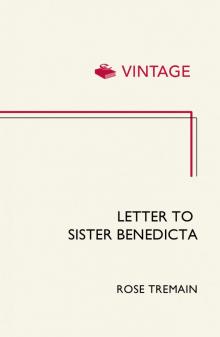 Letter to Sister Benedicta
Letter to Sister Benedicta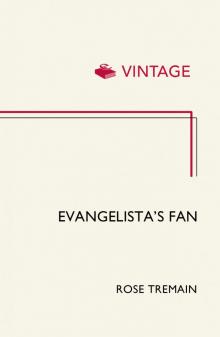 Evangelista's Fan
Evangelista's Fan Restoration
Restoration The Road Home
The Road Home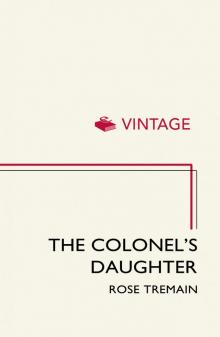 The Colonel's Daughter
The Colonel's Daughter The Way I Found Her
The Way I Found Her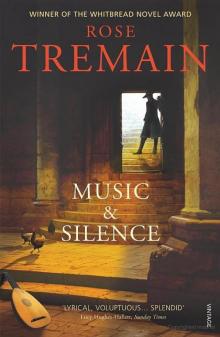 Music & Silence
Music & Silence